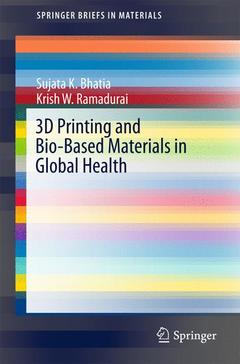3D Printing and Bio-Based Materials in Global Health, 1st ed. 2017 An Interventional Approach to the Global Burden of Surgical Disease in Low-and Middle-Income Countries SpringerBriefs in Materials Series
Auteurs : Bhatia Sujata K., Ramadurai Krish W.

I. The Current Global Surgical Care Paradigm
1.1 The Global Surgical Burden of Disease: A Global Health Paradigm
1.2 Surgically Avertable Deaths: A Silent Premise
1.3 Defining Essential Surgical Conditions in LMICs
1.4 Disparity of Surgical Service Provision in LMICs1.5 Disparities in Provisional Access to Surgical Instruments and Supplies in LMICs
II. Surgical Interventions in Global Health: Social and Economic Implications
2.1 Surgery: A Highly Cost-Effective Health Intervention
2.2 The Economic Returns of Surgical Interventions
2.3 Catastrophic Healthcare Expenditures: A Perspective
2.4 The Social Returns of Surgical Interventions
III. 3-Dimensional Printing and Rapid Prototyping: Implications for Global Health
3.1 The Dawn of Disruptive Innovations and Frugal Engineering
3.2 3-Dimensional Printing: An Introduction to Rapid Device Prototyping and Fabrication
3.3 The RepRap Rapid Prototyping Device and Fused Deposition Modeling
IV. 3-Dimensional Device Fabrication: Bio-Based Materials and Thermoplastics
4.1 Bio-Based Thermoplastic Polymers in 3D Printing
4.2 Polylactic-Acid: Bio-Based Thermoplastic Polymer Properties and Medical Device
Applications
4.3 Acrylonitrile Butadiene Styrene Thermoplastics: Mechanical and Chemical Profile
4.4 Chemical and Mechanical Profile Modification of Bio-Based Materials: Polymeric Blending
and Natural Polymer Enhancement
V. 3-Dimensional Printing of Medical Devices and Supplies
5.1 The Current State of 3-Dimensional Printing: Fabrication of Medical Devices and Supplies
5.2 Fabrication of High-Utility Integrative Surgical Toolkits
5.3 3-Dimensional Printing in the Surgical Field: Field Applications and Considerations
VI. 3-Dimensional Printing: Interventional Capacities in the Global Health Arena
6.1 3D Printed Instrument and Medical Supply Price Competencies
6.2 Barriers to Entry and Adoption of Medical Device Innovations in LMICs
6.3 3D Printing: A Paradigm Shift in the Global Medical Device and Humanitarian Supply Chain
6.4 3D Printing: Global Open Source Blueprint and Information Dissemination
6.5 The Future of Bio-Based Materials Development in Medical Device Fabrication
Examines the novel use of locally sourced, sustainable, bio-based plastic materials and 3D printing platforms to fabricate low-cost medical devices
Explains the impacts of 3D printers and medical devices in enhancing social, economic, and public health dynamics in developing countries
Provides a novel, feasible, comprehensive, and translational approach to addressing healthcare disparities in developing countries
Includes supplementary material: sn.pub/extras
Includes supplementary material: sn.pub/extras
Date de parution : 07-2017
Ouvrage de 115 p.
15.5x23.5 cm



